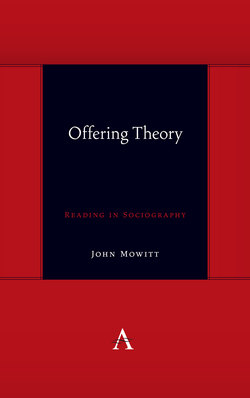Offering Theory

Реклама. ООО «ЛитРес», ИНН: 7719571260.
Оглавление
John Mowitt. Offering Theory
Отрывок из книги
Offering Theory
Reading in Sociography
.....
Several matters follow from this and since they will figure in the “readings” that follow they call for attention. Perhaps the most urgent of these bears on the matter of what it means to treat reading as an offering of Theory that is theoretical. Derrida has, with his usual abandon, aligned reading and mourning (see The Work of Mourning), and here Barthes, as if channeling Bataille, aligns it with perversion and ultimately immorality. Whether it is best aligned with one or the other is not as pressing as the following question: What makes such formulations seem exorbitant, or what have we misread in reading in failing to recognize the possibility of such alignments? My response has the advantage of being straightforward: We have failed to recognize what reading does, when and where it brings about what it brings about. Reading theorizes in carrying on, struggling to make sense, within the encounter between the text and a possible world. Put differently, what we offer in sacrificing reading to this encounter is Theory, and yes, at a very basic level I wish to underscore the obvious, namely, that if Theory has mattered for however long it has mattered, it is because it grips and deeply rattles the way reading takes place. In a sense, this is the insight that silently animates any list of the sort adjective (“feminist”) or surname (Butlerian) followed by the word “reading.” More than a demonstration, this then is a proposal about offering Theory that sacrifices it properly to the readings it propels and the reading it is, the reading by which Theory became what it is. In short, to offer Theory is to offer (its) reading, neither close nor distant, slow nor fast, but reading. Implacably, this pushes us toward what I take to be the opening generated by sacrificing Theory properly, namely, what Barthes sought to delimit, in another context, through the test of commutation, or in my more pedestrian jargon, the when and the where of Theory. When does the reading that theorizes start and stop? Where does this take place?
These evocations of genealogy and geography are, I will propose, helpful ways to think through one of the more generatively enigmatic formulations in Barthes’s corpus. It derives from the section named “Interpretation” in S/Z and reads (in my translation): “To interpret a text is not to give it a (more or less grounded, more or less free) meaning, but on the contrary to discern of what plural it is made” (Barthes 1974, 5). Immediately dashing the hopes of my students who want to read here license for any interpretation whatever, Barthes pressures the “plural” in ways that matter to the chiasmus of reading and Theory. Specifically, the plural designates a generative potentiality in the gesture of reading that enables theories of the typological sort to emerge. Or, to retrieve a few additional formulations from “For a Theory of Reading”:
.....